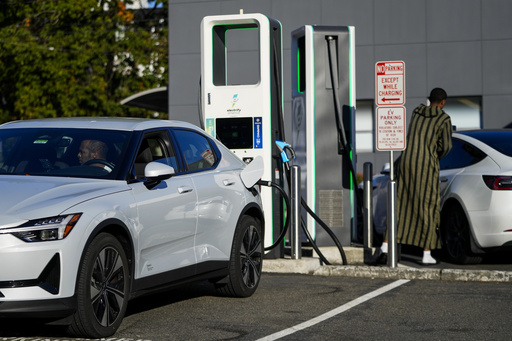
WASHINGTON — President-elect Donald Trump is poised as he prepares to enter office, with a significant opportunity to lead the country forward. His election was driven by widespread voter dissatisfaction regarding high prices and a hunger for significant changes within the United States. However, Trump steps into a role at a time when the economy is positioned for potential growth.
The current economic climate features a low unemployment rate and diminishing inflation levels. Moreover, the Biden administration has laid out an extensive list of infrastructure initiatives ready to move from concept to execution over the coming years. Among these projects are the TSMC chip manufacturing facility in Arizona and a new electric vehicle factory from Hyundai in Georgia, alongside a modernization of I-375 in Michigan, all contributing to an extensive portfolio of projects that will take years to finalize.
What this means for Trump is that he may find himself in a position to claim significant contributions to America’s recovery—claiming credit for the improvements sought by voters. Nevertheless, it remains to be seen whether he will endorse these ongoing projects initiated under Biden’s watch.
Biden had acknowledged in recent remarks that the positive effects of his policies might not be realized until after his term concludes in January. Speaking from the Rose Garden, he noted how while some accomplishments are already impacting the American populace, the bulk of the benefits will unfold over the next decade. “The road ahead is clear,” he stated, signaling ongoing efforts to boost the economy, even if their effects take time to manifest.
Despite Trump’s disdain for Biden’s strategies during his campaign, he has yet to disclose which initiatives he might choose to discontinue. Trump previously mentioned a plan to eliminate any unspent resources tied to what he labeled the Inflation Reduction Act. On the popular Joe Rogan podcast, he suggested that tariffs would bolster manufacturing more effectively than the financial support offered in the CHIPS and Science Act.
However, Biden’s aides have hinted that Trump is likely to continue these planned projects, potentially taking credit for Biden’s initiatives. Similar to Congress members who publicly praise infrastructure developments in their districts while previously voting against such measures, Trump might face pressure to keep these beneficial projects afloat. The Biden administration, having invested significantly in promoting its role in these projects, has set the groundwork for a seamless transition, enabling Trump to simply rebrand them under his name.
If Trump chooses to pursue a repeal of programs, it is unlikely that he will do so indiscriminately, especially in states that supported him during this election cycle, even with Republican pressures to initiate token reversals as part of new tax cuts.
In making her viewpoint clear, Karoline Leavitt, a spokeswoman for the Trump-Vance transition, claims: “The American people re-elected President Trump by a resounding margin giving him a mandate to implement the promises he made on the campaign trail. He will deliver.”
Meanwhile, Natalie Quillian, a deputy chief of staff for Biden’s administration, emphasized that the ongoing initiatives are already demonstrating a promising impact on the economy. “We have already announced investments for 70,000 infrastructure and clean energy projects, catalyzed nearly $1 trillion in private sector investment, lowered prescription drug prices, and created 1.6 million construction and manufacturing jobs,” she affirmed. Quillian expressed confidence in the trajectory of Biden’s agenda, looking toward continued benefits unfolding for American citizens in the years to come.
As Trump prepares to take office, he will inherit an economy that shows signs of improvement on multiple fronts, although he has described economic conditions in starkly negative terms. The Republican candidate emerges victorious with an unemployment rate of 4.1% and inflation measured at 2.4%, alongside a Federal Reserve that appears ready to support continued growth through interest rate adjustments. Federal Reserve Chair Jerome Powell has exclaimed that the economy is “strong overall.”
Nevertheless, voter sentiment paints another picture—many perceived the economy as struggling and placed blame on Democrats for inflation driven by post-pandemic supply chain issues, government aid effects that prompted job growth, and the disruptions following Russia’s invasion of Ukraine that inflated energy and food prices.
Inflation was a significant issue for voters, with nearly 90% indicating it was a key factor in their election choices, according to AP VoteCast, a comprehensive survey involving over 120,000 voters, reflecting Trump’s advantage among voters concerned about inflation. Although economists who previously advised Trump caution that economic indicators may not fully represent a solid economy, pointing towards burgeoning government debt fueling the current growth.
Joseph LaVorgna, a former chief economist of the White House National Economic Council under Trump, expressed that government expenditure plays a crucial role in sustaining the economy. He also noted that a considerable part of job growth has stemmed from the public and health sectors rather than traditional manufacturing or other private industries.
Moreover, some Republican lawmakers recognize and support maintaining energy tax credits originating from the Inflation Reduction Act. A cohort of eighteen GOP House members recently petitioned House Speaker Mike Johnson to retain these credits. Trump has previously indicated an intention to eliminate Biden’s electric vehicle incentives but has shown some inconsistency, as he now aligns himself with the supportive sentiments of Tesla CEO Elon Musk. Following Musk’s endorsement, Trump proclaimed his support for electric vehicles, suggesting that his administration could revitalize the EV industry that had previously become politically charged under Biden, allowing bipartisan support for the sector.
Trump’s evolving stance on electric vehicles may pave the way for renewed focus on the industry, potentially bridging the political divide that had framed EV discussions during Biden’s tenure.
